Younge Surname Ancestry ResultsOur indexes 1000-1999 include entries for the spelling 'younge'. In the period you have requested, we have the following 287 records (displaying 161 to 170): Single Surname Subscription | | | Buying all 287 results of this search individually would cost £1,464.00. But you can have free access to all 287 records for a year, to view, to save and print, for £100. Save £1,364.00. More... |
These sample scans are from the original record. You will get scans of the full pages or articles where the surname you searched for has been found. Your web browser may prevent the sample windows from opening; in this case please change your browser settings to allow pop-up windows from this site. Wandsworth Baptisms
(1752)
The ancient parish of Wandsworth in Surrey comprised the single township of Wandsworth, including the hamlets of Garratt, Half Farthing and Summers Town. It lay in the archdeaconry of Surrey of the diocese of Winchester: unfortunately, few bishop's transcripts of Surrey parish registers survive earlier than 1800. Although the original parish registers of Wandsworth doubtless commenced in 1538, the volume(s) before 1603 had been lost by the 19th century. In 1889 a careful transcript by John Traviss Squire of the first three surviving registers was printed, and we have now indexed it year by year. The baptism registers from 1727 to 1774 normally give date of baptism, and the names of the child and its father and mother, but do not give date of birth.YOUNGE. Cost: £2.00.  | Sample scan, click to enlarge
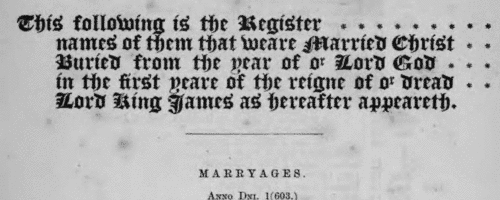
| Wandsworth Burials
(1752)
The ancient parish of Wandsworth in Surrey comprised the single township of Wandsworth, including the hamlets of Garratt, Half Farthing and Summers Town. It lay in the archdeaconry of Surrey of the diocese of Winchester: unfortunately, few bishop's transcripts of Surrey parish registers survive earlier than 1800. Although the original parish registers of Wandsworth doubtless commenced in 1538, the volume(s) before 1603 had been lost by the 19th century. In 1889 a careful transcript by John Traviss Squire of the first three surviving registers was printed, and we have now indexed it year by year. The early burial registers contain little detail - date of burial, and full name. For the burial of children, the father's name is also stated; for the burial of wives, the husband's. Such details as date or cause of death, age, address or occupation are almost never given. The burial registers are considerably more bulky than the baptism registers, because the burying ground was used by Dissenters, who formed a large part of the population. These include a French Protestant congregation that worshipped in a church (the registers of which do not survive) in a courtyard immediately opposite the parish church. The Quakers had a cemetery of their own. The 18th-century burial registers also include a surprising number of children sent out to Wandsworth from London to nurse.YOUNGE. Cost: £4.00.  | Sample scan, click to enlarge
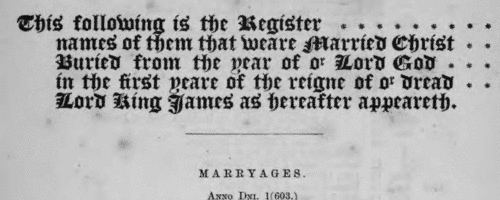
| Intended Bridegrooms in Yorkshire
(1626)
William Paver, a 19th-century Yorkshire genealogist, made brief abstracts of early marriage licences (now lost) in York Registry. His manuscript, which became Additional Manuscripts 29667 in the British Museum, was transcribed by J. W. Clay, F. S. A., and printed in various issues of the Yorkshire Archaeological Journal: this is from the volume for 1903. Paver did not note the dates of the licences, merely listing them by year: his abstracts give the names and addresses of both parties, and the name of the parish church in which it was intended that the wedding would take place.YOUNGE. Cost: £4.00.  | Sample scan, click to enlarge

| PCC Probates and Administrations
(1630)
The Prerogative Court of Canterbury's main jurisdiction was central and southern England and Wales, as well as over sailors &c dying abroad: these brief abstracts, compiled under the title "Year Books of Probates", and printed in 1902, usually give address, date of probate and name of executor or administrator. They are based on the Probate Act Books, cross-checked with the original wills, from which additional details are, occasionally, added. The original spelling of surnames was retained, but christian and place names have been modernised where necessary.YOUNGE. Cost: £2.00.  | Sample scan, click to enlarge
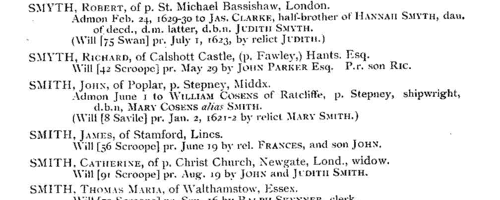
| PCC Probates and Administrations
(1631)
The Prerogative Court of Canterbury's main jurisdiction was central and southern England and Wales, as well as over sailors &c dying abroad: these brief abstracts, compiled under the title "Year Books of Probates", and printed in 1902, usually give address, date of probate and name of executor or administrator. They are based on the Probate Act Books, cross-checked with the original wills, from which additional details are, occasionally, added. The original spelling of surnames was retained, but christian and place names have been modernised where necessary.YOUNGE. Cost: £2.00.  | Sample scan, click to enlarge
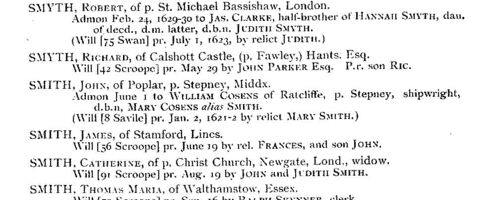
| PCC Probates and Administrations
(1632)
The Prerogative Court of Canterbury's main jurisdiction was central and southern England and Wales, as well as over sailors &c dying abroad: these brief abstracts, compiled under the title "Year Books of Probates", and printed in 1902, usually give address, date of probate and name of executor or administrator. They are based on the Probate Act Books, cross-checked with the original wills, from which additional details are, occasionally, added. The original spelling of surnames was retained, but christian and place names have been modernised where necessary.YOUNGE. Cost: £2.00.  | Sample scan, click to enlarge
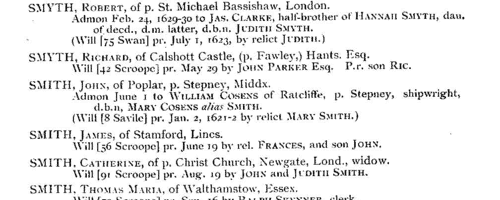
| PCC Probates and Administrations
(1633)
The Prerogative Court of Canterbury's main jurisdiction was central and southern England and Wales, as well as over sailors &c dying abroad: these brief abstracts, compiled under the title "Year Books of Probates", and printed in 1902, usually give address, date of probate and name of executor or administrator. They are based on the Probate Act Books, cross-checked with the original wills, from which additional details are, occasionally, added. The original spelling of surnames was retained, but christian and place names have been modernised where necessary.YOUNGE. Cost: £2.00.  | Sample scan, click to enlarge
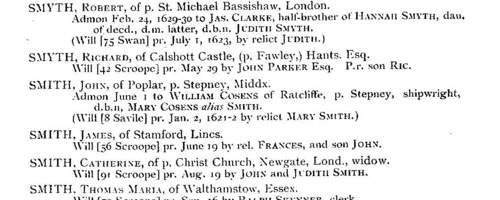
| PCC Probates and Administrations
(1634)
The Prerogative Court of Canterbury's main jurisdiction was central and southern England and Wales, as well as over sailors &c dying abroad: these brief abstracts, compiled under the title "Year Books of Probates", and printed in 1902, usually give address, date of probate and name of executor or administrator. They are based on the Probate Act Books, cross-checked with the original wills, from which additional details are, occasionally, added. The original spelling of surnames was retained, but christian and place names have been modernised where necessary.YOUNGE. Cost: £2.00.  | Sample scan, click to enlarge
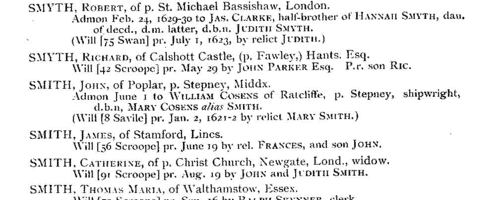
|  Persons of standing recommending London police recruits
(1830-1842) Persons of standing recommending London police recruits
(1830-1842)
The Metropolitan Police Register of Joiners (MEPO 333/4) lists policemen joining the force through to 31 December 1842 (to warrant number 19892). The register is alphabetical, in so far as the recruits are listed chronologically grouped under first letter of surname. It is evidently a continuation of a similar earlier register, not closed until its alphabetical sections were filled: consequently, there are no entries in this register for the initial letters N, O, Q, U, V, X, Y or Z; and the sections of this register start at different dates - A 18 April 1840 (warrant number 16894); B 11 December 1830 (5570); C 7 September 1830 (4988); D 27 May 1833 (8445); E 15 December 1838 (14476); F 30 March 1832 (7372); G 1 December 1835 (11,184); H 25 April 1832 (7457); I and J 13 February 1837 (12449); K 2 January 1838 (13457); L 3 October 1834 (9905); M 15 November 1832 (7999); P 4 October 1831 (6869); R 4 September 1837 (13021); S 30 March 1835 (10366); T 6 April 1840 (16829); W 30 December 1833 (9096). The register gives Date of Appointment, Name, Number of Warrant, Cause of Removal from Force (resigned, dismissed, promoted or died), and Date of Removal. Those recruits not formerly in the police, the army, or some government department, were required to provide (normally) at least two letters of recommendation from persons of standing, and details of these are entered on the facing pages: the names in these are indexed here (the police recruits are indexed separately and not included here). Recruits transferred from other forces or rejoining the force did not normally need recommendations - in the latter case, former warrant numbers are given - but some recommendations are from police inspectors, even other constables. Recruits coming from the army sometimes have general military certificates of good conduct, but most often have a letter from their former commanding officer; recruits recommended by government departments (most often the Home Office) similarly have letters from the head of department. But the great majority of the names and addresses in these pages are of respectable citizens having some sort of personal acquaintance with the recruit. Where more than two recommendations were provided, the clerk would only record one or two, with the words 'and others'. Tradesmen are sometimes identified as such by their occupations; there are some gentry. Although the great bulk of these names are from London and the home counties, a scattering are from further afield throughout Britain and Ireland. YOUNGE. Cost: £8.00.  | Sample scan, click to enlarge

| Inhabitants of Chippenham in Wiltshire
(1790-1797)
The provincial sections of the Universal British Directory include lists of gentry and traders from each town and the surrounding countryside, with names of local surgeons, lawyers, postmasters, carriers, &c. (the sample scan here is from the section for Bath). The directory started publication in 1791, but was not completed for some years, and the provincial lists, sent in by local agents, can date back as early as 1790 and as late as 1797.
YOUNGE. Cost: £6.00.  | Sample scan, click to enlarge

|
Research your ancestry, family history, genealogy and one-name study by direct access to original records and archives indexed by surname.
|













